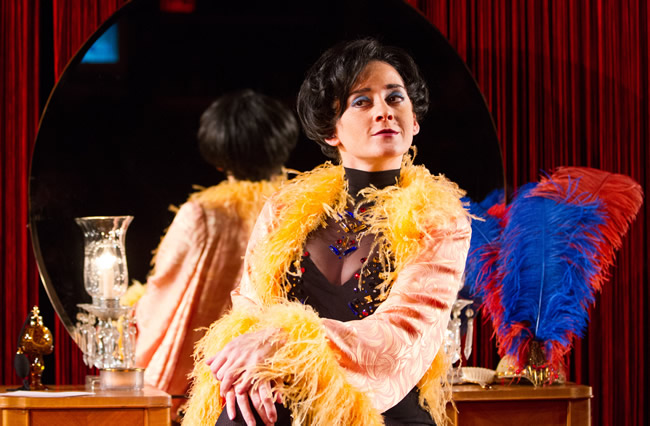 What happens when American women move to Paris for creatively fulfilling careers?
What happens when American women move to Paris for creatively fulfilling careers?
They sing.
Or at least that’s what happened to a couple of singular women at the beginning of the 20th century.
The two of them — Gertrude Stein and Josephine Baker — are featured characters in two one-act operas from Tom Cipullo, “After Life” and “Josephine,” which play back to back in a current performance from UrbanArias at the Atlas Performing Arts Center.
“After Life,” with a libretto by David Mason, has Stein looking back at her life from some gauzy purgatory, raising questions and conjuring scenes from her past, specifically with a cocksure Pablo Picasso and an unnamed waif who once sold her the flower on which she made her famous musing (“a rose is a rose is a rose”) but was later lost in the holocaust, raising the question that whatever their artistic fame, what did these two do to avoid the horrors of the war?
It makes its point vividly, largely through the beautiful voices enlisted for the parts — mezzo-soprano Catherine Cook is full and rich and ringing voice, much like one would hope to hear in the afterlife. Her unerring tone make her questions that much more compelling.
Baritone Michael Mayes is full of swagger as Picasso and soprano Ava Pine makes quite an impression as she holds high notes softly as the representational flower girl.
The singing overall is enhanced by the close quarters — no need for amplification here. In “After Life” there is a lot of deft modernist atonality from the talented five piece Inscape Chamber Orchestra — Anne Donaldson on violin, Natalie Spear on cello, Susanna Loewy on flute, Evan Solomon on clarinet and R. Timothy McReynolds on piano. UrbanArias founder Robert Wood conducts.
The one act presentations of each add a succinct impact as well. No sprawling casts of hundreds or multi-scened storyline necessary.
The one woman “Josephine” may speak more directly than the first, possibly because her fascinating story is so rarely told. Her 60 years in show business, which reached its pinnacle when she took Paris by storm in the 1920s (yes, Stein and Picasso were fans, but that isn’t brought up), also had its snags.
She found when she returned to the United States she was faced with the usual discrimination and Jim Crow laws. In addition to her groundbreaking and fearless performance skills, Baker was also somewhat of a hero, who aided both the French Resistance in World War II and the Civil Rights Movement in the United States.
And she also raised a dozen adopted children, hoping to demonstrate that children of all backgrounds could indeed live together. She kept entertaining, though, and mounted continual comebacks until her death in 1975 at 68.
In Cipullo’s “Josephine,” receiving its world premiere, Baker is giving a rare interview backstage during her latest comeback in 1975, reminiscing, even as she changes details of her life, or turns on the seductive charm that comes so natural to her.
Soprano Melissa Wimbish is a tour-de-force in the part, sassy and proud of her accomplishments but still saddened by all of the problems of the world around her, with a voice that can convey both.
Cipullo’s music seems more at odds with her performance in this piece; the orchestra overpowers her at times, such that when she makes her strongest points, she speaks them, when the orchestra is silent.
Though some of the melody is said to be lifted from a 1927 Bix Beiderbecke piano work, there could be a more overt jazz feel to the piece, since Baker helped introduce the jazz age to Europe.
Besides the composer, there is a visual connection between the two pieces as well, with mirrors and yellow roses playing a role in each, thanks to David L. Arsenault’s sleek and simple set designs.
Under the direction of Alan Paul, “After Life / Josephine” makes for an unusually satisfying double shot of intimate opera.
“After Life / Josephine,” presented by UrbanArias, plays through April 9 at the Atlas Performing Arts Center, 1333 H St NE, Washington.